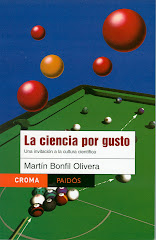Published in Milenio Diario, december 23, 2009
 Unlike the simplified models of theory, reality is a complex tangle, a web whose conforming elements are connected to one another in complex and multiple ways.
Unlike the simplified models of theory, reality is a complex tangle, a web whose conforming elements are connected to one another in complex and multiple ways.
Science is the discipline that helps understand such connections. It produces models that, even though ideal, are reliable, and therefore help us to make appropriate decisions. Politics, on the other hand, is the art of taking advantage of these connections, or building the ones that are lacking, to make that things happen in a society ("the art of the possible", chancellor von Bismarck is said to have called it).
Scientific knowledge is often the impulse and basis for constructing political action. But it is not enough: political ability is needed to make the web strong enough.
Sometimes this can be achieved, sometimes not. In Copenhagen it was not, even though there is solid scientific data and consensus about what to do. The forces opposing the agreement -the economical costs of reconverting the industries of powerful countries; the unavoidable political costs linked to them– prevented it from happening.
On the other hand, in
But science and politics are processes: they never stop. Sooner or later, the policies necessary to fight climate change will have to be agreed upon. Unless, of course, we discover something new: an unexpected piece of good news that would also have to be based in science.
In matters of human, sexual and reproductive rights, the advances, though slow, are not stopping. Autopsies were prohibited, by religious reasons, for centuries, until the Renaissance. Blacks and women, considered as inferiors, could not vote until the middle of last century. In vitro fertilisation caused a hot debate, also because of religious prejudice; the fact that the expression "test-tube baby" sounds obsolete nowadays is proof that societies advance and assimilate changes that are beneficial for them.
Until recently, homosexuality was legally punished. Today, the full equality of couples, sexual orientation notwhitstanding, is recognized in the law. In the near future, other items are pending: the right to abortion, euthanasia, research with stem cells. And furthermore, a proposal for "animal rights" for the great apes (gorillas, orangutans, chimps).
In a secular state, decisions must be based in reliable knowledge, and taken to widen, not to suppress, the rights of everybody. Science helps politics build new links so that the necessary changes in the complex social web can be built and sustained. Congratulations…! and Merry Christmas.
(translated by Adrián Robles Benavides) To receive Science for pleasure weekly
in your email, subscribe here!




